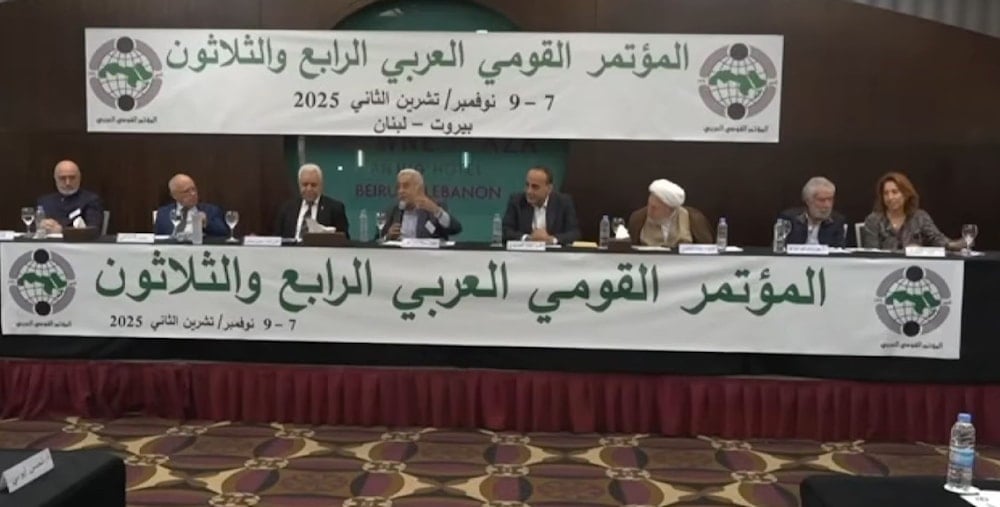Arab National Congress appoints new panel in 34th session
The 34th Arab National Congress concluded in Beirut, electing a new General Secretariat headed by Dr. Maher al-Tahir, with Ghassan Ben Jeddou appointed as Deputy Secretary-General.
-

The panel of the Arab National Congress at its 34th meeting, Beirut, Lebanon, November 10, 2025 (Al Mayadeen)
The 34th session of the Arab National Congress concluded its proceedings in Beirut on Monday, with a diverse group of political and intellectual figures from across the Arab world in attendance.
The conference elected a new 25-member General Secretariat and selected Dr. Maher al-Tahir as its Secretary-General, after which the newly formed body held its first meeting and appointed the media figure Ghassan Ben Jeddou as Deputy Secretary-General.
Held over three days in the Lebanese capital, the Arab National Congress brought together more than 250 figures from various fields and countries for a program that included several sessions addressing a number of pressing issues across the Arab world.
A look into the ANC
The Arab National Congress (ANC) is a pan-Arab political forum established in the late 20th century with the aim of fostering unity, cooperation, and strategic dialogue among Arab intellectuals, political leaders, and civil society figures. The Conference serves as a platform for addressing the collective challenges facing the Arab world, including foreign intervention, occupation, normalization efforts with "Israel", and internal divisions across the region.
Guided by pan-Arab and anti-colonial principles, the ANC brings together voices from across the Arab political spectrum, ranging from leftist and nationalist movements to independent thinkers. It functions not as a governmental body but as a space for political consultation and the reinforcement of a shared Arab identity rooted in sovereignty, resistance, and solidarity with Palestine.
In recent years, the Congress has taken strong stances against normalization with the Israeli occupation, reiterating its firm support for the Palestinian cause and rejecting any agreements that undermine Palestinian rights. It has also voiced opposition to foreign interference in Arab countries, including Syria, Iraq, Libya, and Yemen, calling instead for regional solutions based on dialogue and respect for national sovereignty.
The ANC has also played a role in maintaining Arab public engagement with regional issues often sidelined in official discourse. Through its annual meetings, policy papers, and declarations, it continues to serve as a hub for intellectual resistance and strategic vision in a region marked by shifting alliances and geopolitical fragmentation.

 2 Min Read
2 Min Read








